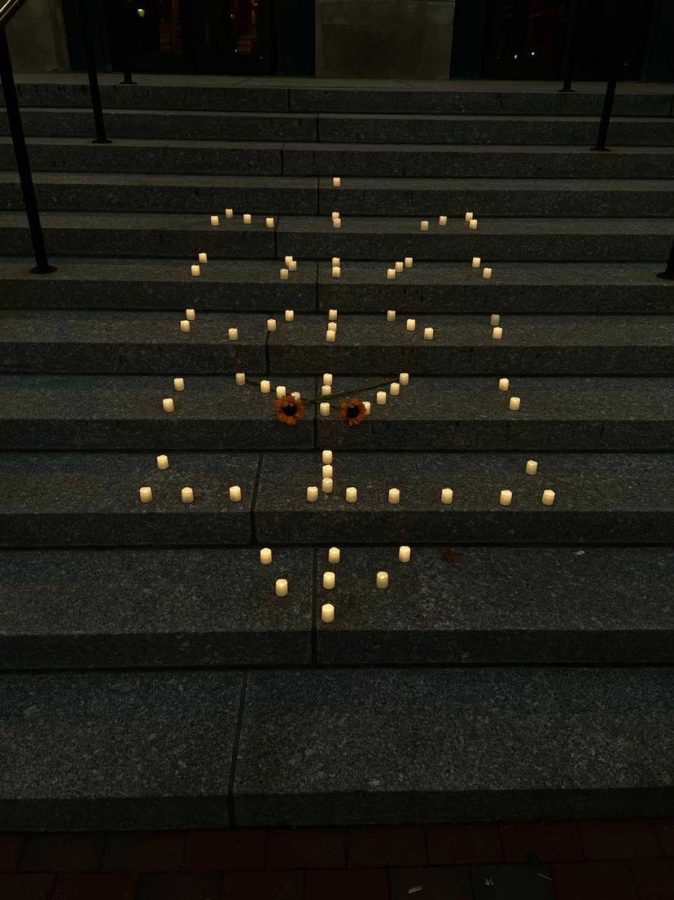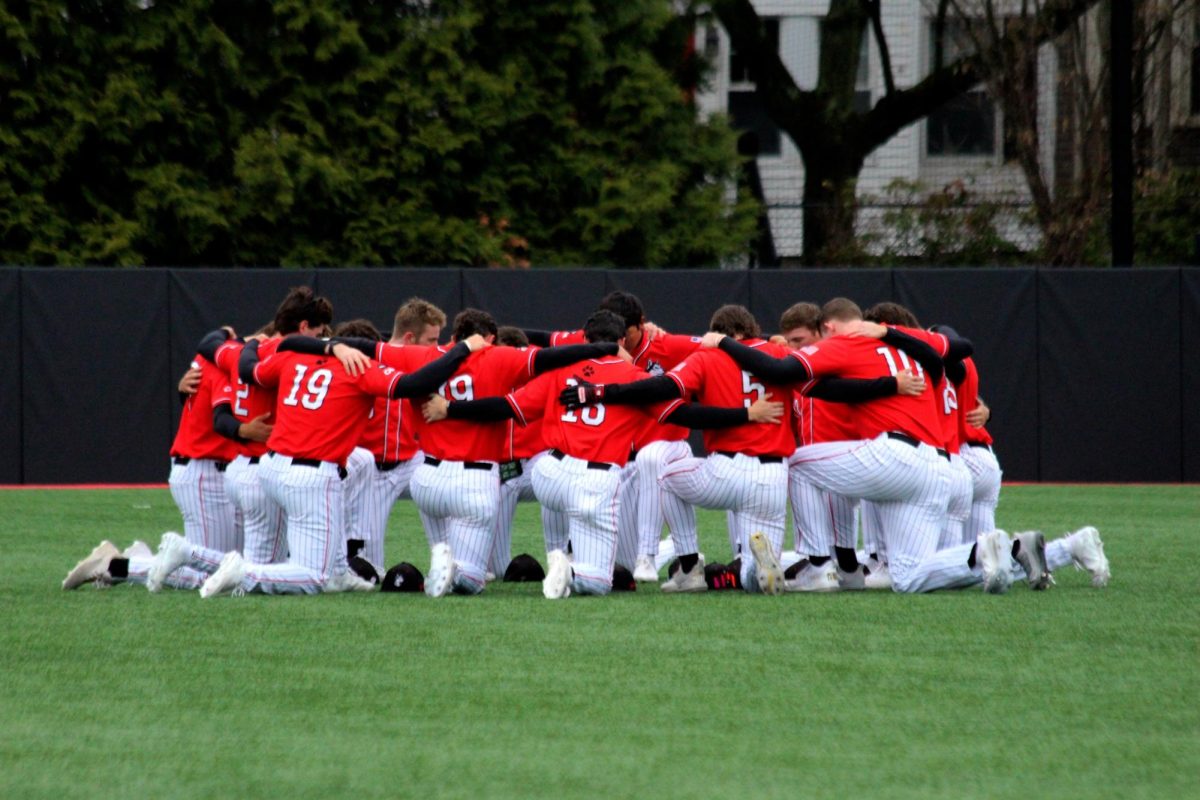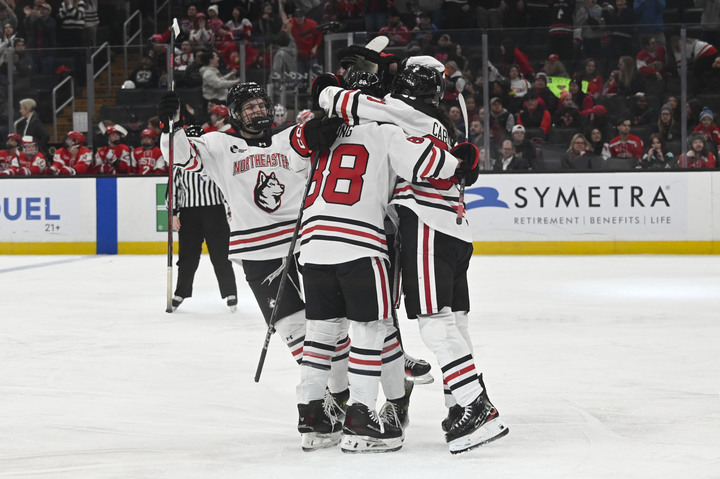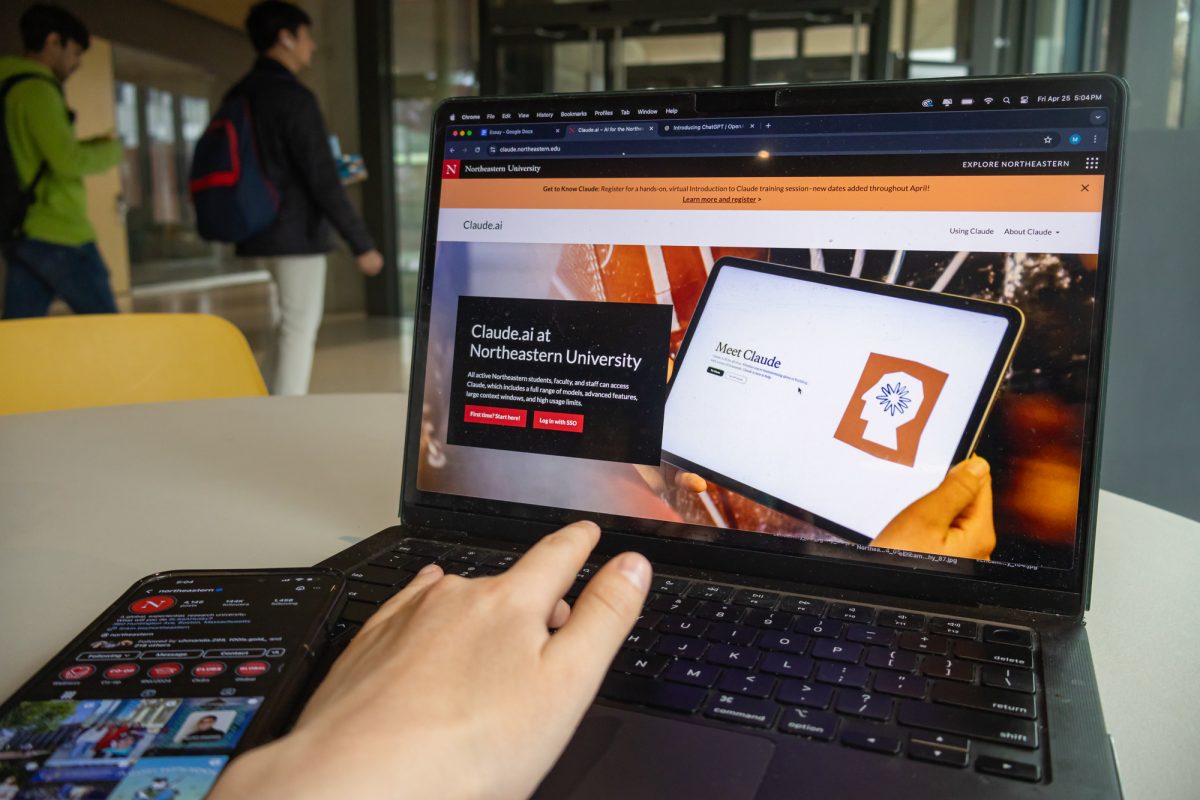Ukrainian students ask Northeastern for support during the war at home
Northeastern’s Ukrainian Culture Club hosted a vigil April 7 to commemorate the lives lost in the war. At the opening of the vigil, candles were arranged at the Krentzman Quad in the form of the tryzub, Ukraine’s coat of arms. Photo courtesy of Terenia Hankewycz.
April 12, 2022
On March 4, 13 students affiliated with the Ukrainian Cultural Club and Russian Speaking Club at Northeastern University signed an email to administrators across the university, asking for help and support amid the outbreak of war in Ukraine. The plea was met with no response, according to those who signed the email.
Since the beginning of the Russian invasion Feb. 24, some Ukrainians on campus said they have been worried about the safety of their families, the additional expenses incurred and the loss of their home and community in Ukraine. Destruction of Ukrainian cities and towns including Kyiv, where students are from, has left houses and personal belongings in rubble. Students affected by the war cannot return home for the foreseeable future.
Sona Tatarian, a fourth-year business administration and economics combined major from Kyiv, explained how much she wanted to go home following her graduation this May, but now does not know when she will be able to return.
“I love Ukraine and the culture and I wanted to work there,” Tatarian said. “But I have no idea what my home looks like.”
After their home country became a warzone, some Ukrainian students in Boston have coped with the weight of the situation by organizing cultural festivals to raise funds for people back at home and protesting in Boston to remonstrate Russian aggression against Ukraine. Although students are active on the streets of Boston, they expect support from their schools.
“Students are facing financial struggles and need financial aid,” Tatarian said.
Thirty three percent of the student body on Northeastern’s campus is international students, as of fall 2021. Because of the global nature of the university, the administration has a history of assisting refugees. On Aug. 15, 2021, Afghanistan came under the rule of the Taliban for the first time since 2001, meaning that the opportunity for women to pursue higher education was taken away. Students fled their home country for the education Northeastern promised them.
Ukrainian students who have recently become refugees said they feel they have not had comparable support, and instead said they feel abandoned by a school they call their second home. Alex Melnik, a second-year business administration major and Kyiv native, pointed out the help that students need while studying on campus during the conflict at home.
“No response to emails?” Melnik said. “People need financial assistance. Mental assistance. They need help.”
The signed email sent to Northeastern administration listed steps that signatories felt the administration could, and should, take to recognize the plight of students’ situation and lighten the burden while on campus.
The first request is financial aid for Ukrainian students. Enrolled international students are not eligible for financial aid at the university. As they explained in the email, now is as great of a time as ever to grant affected students monetary support.
“Our banks have ceased operations, property has been destroyed, our money has been stolen, and our loved ones have been killed,” the email read.
The email also asks for ease of academic workload and spreading awareness of their current situation on the Northeastern campus. Professors have been understanding, softening deadlines and getting students back on track with work, but students also want to hear from administration.
Students have contacted different services on campus seeking support. Melnik said he has been in contact with the financial department on numerous occasions and never got a productive response.
He said that he thinks the efforts to reach out to school services are hopeless, and the silence of the administration on financial aid has made leaving the school a possibility for him.
“I’ve talked to the university several times, to the financial department, for a month,” Melnik said. “They keep saying that something’s being done. I think nothing will be done, but I want [the school] to be honest if they are not coming up with a solution. I would rather leave university now while there is time to fight in Ukraine and do something good.”
Northeastern held an in-person panel, with the option of joining online, March 10 to facilitate discussion about the war. The panel included a discussion about how to cope with the precarious situation that the war has placed on students and staff. Faculty of the College of Social Sciences and Humanities with expertise in global politics shared their knowledge about the war and its implications.
However, many Ukrainian students said they feel awareness events are not enough to show the university’s support. This sentiment was strengthened following the vandalism of the spray paint rock in Centennial Common, which had been painted yellow and blue to support Ukrainian students, on April 5. Members of the Ukrainian Culture Club believed the marking resembled a hate symbol used to represent support of Russia and brought the vandalism to the attention of Northeastern administration and the Northeastern Police Department.
Chancellor and Senior Vice President for Learning Ken Henderson addressed the vandalism in an email to the student body April 6, where he clarified that the symbol was not a hate symbol or political statement, and was painted by an unidentified fraternity in a “misunderstanding.” Members of the Ukrainian Culture Club were unsatisfied with this response.
“Nothing has been done to address the cause of this ‘misunderstanding’; nothing has been done to prevent a future ‘misunderstanding,’” the officers of the club wrote in an email response to Henderson that was later posted to their Instagram. “Ignorance is not an excuse, and choosing not to educate the Northeastern community about this symbol of hate is unacceptable.”
Beyond the limited educational responses and events offered by the University, Melnik said it wasn’t easy learning that other universities, such as the University of Chicago, have started to offer Ukrainian students full-tuition scholarships or other significant financial aid, especially when Northeastern has not responded to students’ pleas for any kind of aid.
“It’s hard seeing that Chicago and other schools are doing something to help Ukrainian students,” Melnik said. “That’s not seen here.”
The financial burden of the war is one of the greatest worries for many students on campus. Without any aid at this point, some of the students who spoke with The News will not have the ability to pay full tuition for more semesters at the university. Though Tatarian will graduate in May, she worries about the Ukrainian students who still have years left of school at Northeastern to pay for.
“What are they going to do with second or first year students who have a long way to go?” Tatarian said. “Are they just going to kick them out?”
As of Thursday night, the school has made no public announcement about financial support for Ukrainian students. University representatives did not provide a comment to The News about Northeastern’s efforts prior to publication.
Some Ukrainian students who spoke with The News contacted We Care, an aid program provided by the school. Students reported receiving different answers during interactions with We Care. Tatarian said that We Care has contacted professors about the current pressure on students and their need for extensions in the upcoming weeks.
After learning about Sasha Brykailo’s situation in an email, the school has not responded with a helpful message, Brykailo said. Brykailo, a third-year international affairs major, has not been on campus since the war started. Since the fall of 2020, she has been on medical leave, staying at her home in Kyiv. She fled westward to the Netherlands March 7 because of incoming Russian threats and stationing of Russian troops at the border.
On the day of the invasion, Brykailo emailed We Care from Ukraine, asking for any assistance in getting back to Boston in time for the start of the Summer I term.
Brykailo said they responded a week later asking about whether she had a ready passport and visa for her return to the United States. She said the delayed response made her feel Northeastern was not working to support her, especially as she was a refugee, alone, in a new country.
“It felt like they responded simply because they felt like they had to,” Brykailo said. “That’s how it felt to me because I already did all the work and left my country. And it wasn’t easy leaving the country because so many people were fleeing.”
Because Brykailo has not been on campus, she was unable to sign the email sent out to the administration. When she learned of the email and that students were only met with silence, she wrote her own email to 16 administrators where she explained her situation and that she feels neglected by the university.
“The feeling of abandonment I have from Northeastern is impossible to put into words,” Brykailo wrote. “I feel betrayed.”
Though short of students’ requests, the Office of Global Services, or OGS, announced that it has postponed deadlines for outstanding bills to July, granting students more time to pay the university. Students who spoke with The News said it is better than nothing, but also said a deferral of two months will not make much of a difference if their towns and banks at home are destroyed and the war is still going on.
Tatarian said OGS has told those who have asked for financial aid that they can get a meal plan if they are struggling to pay for food. But, Tatarian said it has not been clarified whether they would eventually have to pay for the plan. University representatives have not provided any further clarification to The News on the specifics of the meal plan offered to Ukrainian students.
As many students do not know what their homes in Ukraine now look like, they hope that Northeastern can continue to be a second one, which takes action to quell students’ grievances.
“My experience here has been amazing and I’ve made so many friendships and connections and I want to be proud of my university. I hope that Northeastern will support us as much as they can,” Tatarian said.
Editor’s note: This article was updated April 13 at 12:37 p.m. to reflect Northeastern’s findings about the vandalism on the rock.
Editor’s note: This article was updated April 14 at 9:54 p.m. to more accurately reflect the university’s responses to students.







